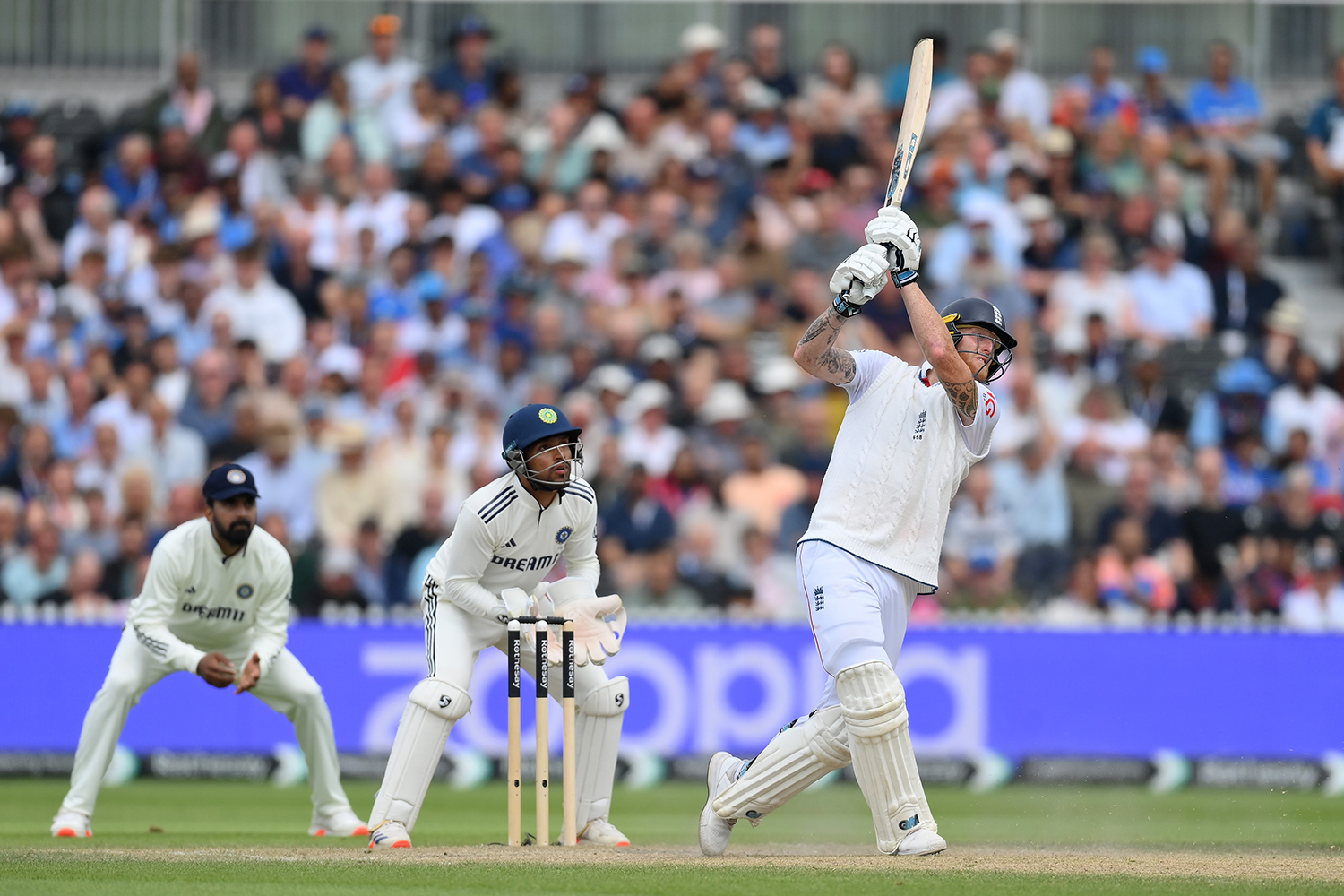The revolutionary concept known as Bazball is now an option rather than a doctrine. And Ben Stokes is even more of a terror with England edging back towards conventional Test cricket.
Purists will shout hallelujah for the new prudent England. Creative chaos addicts may sulk. But nobody could fail to be entertained by England’s textbook assault on India in this Old Trafford Test. In a spectacular morning session they posted their biggest Old Trafford total (669), with Stokes adding a century to his five-wicket haul earlier in the match.
Friday afternoon: Stokes hobbles off (“retired hurt”) on 66. Some say it’s a hamstring. Others call it cramp. Through countless injury struggles Stokes has winced his way to greatness, drawing, one suspects, on the physical courage of his late father Ged, who wrenched a dislocated finger back into place to carry on playing in a rugby league game and later chose amputation over surgery to prolong his career.
The crooked finger century celebration Stokes enacts is a touching homage to his dad as well as a window on his own unbreakability. To watch him limping down the pitch for singles when “twos” were gettable was to fear his body was packing up on him again.
Daft thought. The next morning, Stokes was raising his bent digit to the heavens in a knock of 141, while driving England to a colossal 311 first-innings lead. Old Trafford had already venerated Root and it gave Stokes the same treatment. Their partnership on Friday was a portrait of contrasting characters framed by a unifying greatness.
England’s more strategic approach to this compelling series is starting to feel like preparation for the Ashes. Since the victorious tour of 2010-11, England have lost 5-0, 4-0 and 4-0 in Australia: a pattern no sensible tour planner could ignore.
Against the rising ball of hard Australian wickets, unfettered free expression would probably end with the war being over by Christmas. Again. The hit-everything ethos has never been tested in the cathedrals of Australian red-ball cricket. It would be a bold coach who gave it a try in the first Test in Perth in November. “This is a different England side,” the 2005 Ashes-winning captain Michael Vaughan said here at Old Trafford. “The Bazballers are maturing. To win a big series you can’t just play one way.”
Like most radical ideas in sport, art or life, there is a toning down, a moderation, as convention makes its countermove. The permissive culture takes a backward step. Greater “maturity”, a word many ex-England captains are using, allows the side to marry tactics to circumstances – a bond previously undermined by gung-ho.
“Definitely. For us to play a very strong side like India we’ve had to [change the approach] – to get the results we’ve wanted so far, and going forward as well,” Ollie Pope said. “Had we not played with our brains as well we might not be 2-1 up in the series.
“We talk a lot about trying to absorb pressure when we need to, for example the first hour [on Friday]. Then, when I was batting with Joe we were talking about – right, this could be a time to up it just a little bit, and try to get the runs a bit quicker, especially on the surfaces we’re playing on, the very new-ball friendly surfaces, where the big threats are in the first 10 overs.
Newsletters
Choose the newsletters you want to receive
View more
For information about how The Observer protects your data, read our Privacy Policy
“There might be a time when you think – the 50th, 60th over, this is the time to push forward, and when the new ball comes, absorb a bit of pressure.”
‘In pure Bazball, batting was more or less free love, compared with the long marriage of orthodox play’
‘In pure Bazball, batting was more or less free love, compared with the long marriage of orthodox play’
What Pope is describing is age-old Test match batting: see off the new ball, then be more adventurous. Hit the bad balls, block the good. In pure Bazball, batting was more or less free love, compared with the long marriage of orthodox Test play.
It was conceived, the pundits say, to restore the joy of playing top-level cricket after the long Covid siege, and following a demoralising run of results. With white-ball cricket dominating, the red-ball game was bound to be pulled towards extravagance and risk. The way some tell it, Bazball was never intended to be a religion. The self-indulgence of throwing away one’s wicket without consequences was a developmental phase: the team’s teenage years.
Either way this Old Trafford Test has added layers to an already absorbing series, with stats piled high, like the glass towers rising all across Manchester’s skyline beyond Lancashire’s ground.
A few of those numbers can be indulged. Stokes is only the fourth England men’s cricketer to score a century and a ‘five-fer’ in a single Test, joining Tony Grieg, Ian Botham (who did it five times) and, curiously, Gus Atkinson last year. Stokes passed 7,000 Test runs to go with his 200-plus wickets. Only Garry Sobers and Jacques Kallis had been able to claim that double.
Most relevant to Bazball’s evolution is that England recorded their longest innings since the wild ride started under coach Brendon McCullum. They batted for 157 overs for their 669, beating last year’s madness in Multan, where England scored 837 in 150 overs.
The morning session here will live in folklore: 125 runs added by England, a ton for Stokes and Chris Woakes ripping into India before lunch in a first over that earned him the wickets of Yashasvi Jaiswal and Sai Sudharsan in consecutive balls – a double-wicket maiden that reduced India to nought for two, before Shubman Gill and KL Rahul fought back, with Stokes not bowling at all on account of his stiffness – a major loss as Rahul and Gill defied England’s bowlers.
Thus has a balance been restored between techno and classical, attack and defence. The wilder impulses of Bazball were beguiling and haven’t disappeared entirely. England scored at 4.25 an over and still prefer to be assertive. But with an Ashes series looming, a new circumspection prevails against big-name opposition. The head has reclaimed control from the heart.
Photograph by Gareth Copley/Getty Images



